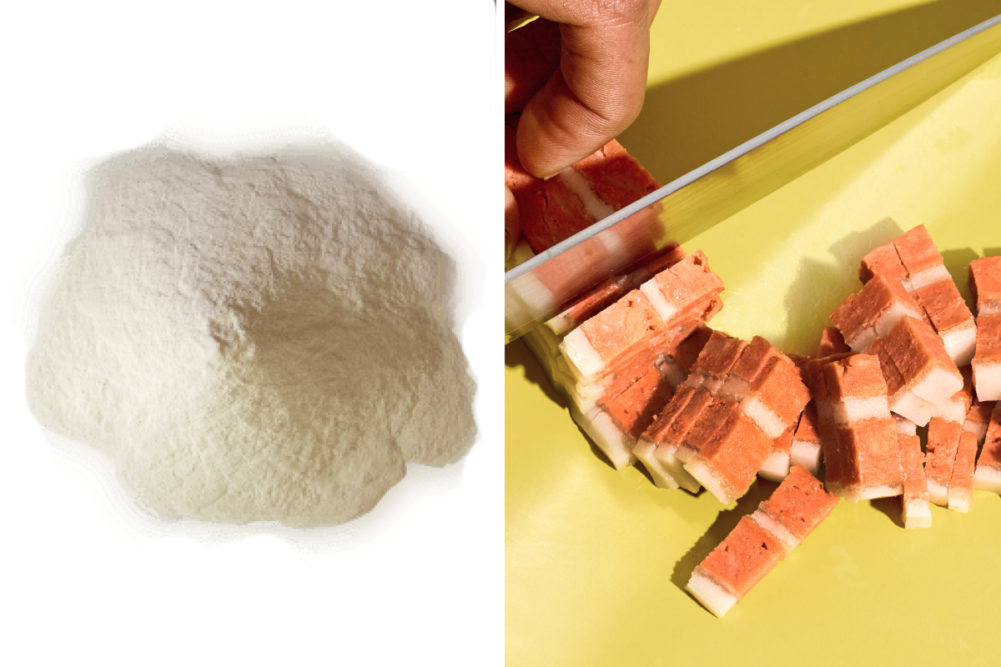SAN FRANCISCO — Two ingredient startups were named the winners of the Kellogg Co. and Unilever-sponsored Innovation Challenge at the Future Food Tech Summit on March 11.
Fibervita was selected among three finalists for Kellogg’s virtual pitch competition, which focused on new microbiome-based innovation for gut health wellness. 77 Foods won Unilever’s Innovation Challenge, which focused on ingredients and processing technologies for improving the taste, texture, sustainability and affordability of plant-based meat and dairy alternatives.
Brazil-based Fibervita developed a proprietary technology to transform cassava bagasse, a byproduct of cassava starch manufacturing, into clean label fiber ingredients. The upcycled cassava fibers may reduce sugar, fat and calorie content in a variety of applications, including baked foods, processed meat, plant-based meat alternatives and dairy. With strong water absorption properties and high fiber content, they serve as an emulsifier, texturizer, stabilizer and flavor enhancer.
Cassava has been shown to boost gut health by nurturing beneficial gut bacteria, said Joao Francisco de Lima, director of research, development and innovation at Fibervita.
The company stood out for its use of a locally sourced ingredient that is widely available in emerging markets, said D’Anne Hayman, vice president of global innovation and nutrition at Kellogg.
“We’re very excited about cassava,” Ms. Hayman said. “It fits well with the work we’re doing to continue to grow our presence in emerging markets. It is an ingredient that is widely consumed, and we’re excited about what we know about its impact on the microbiome.”
Other finalists in the Kellogg Innovation Challenge included Schaumburg, Ill.-based Comet Bio, which upcycles croft leftovers to create an arabinoxylan plant fiber extract, and French startup Green Spot Technologies, which upcycles peels, seeds and pulps into functional ingredients using a proprietary fermentation process.
French startup 77Foods developed a plant-based adipose tissue that closely resembles that of meat. It slowly releases oil upon cooking and has been used to develop animal-free bacon alternatives, which already are available through private label and foodservice channels.
“Meat is so delicious because of one main factor, which is fat,” said Nicolas Schweitzer, co-founder and chief executive officer of 77 Foods. “Animal fat is amazing. It will infuse into the meat and create this intensity and savoriness that is very hard to replicate with plant-based fats. Competing products on the market are mostly using coconut oil or pine oil, because they are stable at room temperature. They melt when you heat them, so they’re kind of missing the point. They also have a lot of saturated fat, which is not very good for your health.”
The company’s plant-based fat is made using sunflower oil.
“77 Foods, in our view, had the strongest consumer-centric pitch, highlighting the importance of the animal fat that gives delicious meat products its flavor when developing plant-based products,” said André Pots, director of product and process science foods and refreshment at Unilever. “They claim to have cracked the savory taste from conventional animal fat, which is not an easy one.”
Other finalists in the Unilever Innovation Challenge included ProMeat, an Indian startup using elephant foot yam to create plant-based chicken products, and Eighth Day Foods, an Australian startup using sweet lupins to create plant-based meat alternatives.
Kellogg and Unilever will work with the winners to unlock opportunities for future collaboration.






